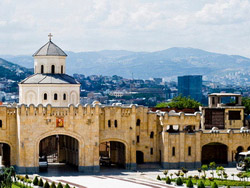Story

Tbilisi is a city with a rich history, whose origins go back to ancient times. In sources and ancient chronicles, Tbilisi is mentioned from the 4th century BC. e. However, archaeological excavations, as a result of which dwellings and burial grounds were found, indicate that the fertile and comfortable area in the Kura River valley, where modern Tbilisi is located, was inhabited back in the Neolithic period.
The city had a very advantageous location, with trade routes to the south to the Arab countries, north to Russia, west to Byzantium and east to India. This factor determined the rapid development of the city and in 458 Tbilisi became the capital of Iberia. This was due to the fact that the king of Iberia, Vakhtang Gargasale, decided to move his capital from Mtskheta to a city with a more advantageous strategic location and a more developed fortification system. Since then, Vakhtang Gorgasale has been considered the founder of the city.
Since the mid-seventh century, Tbilisi was under the rule of Arab conquerors, who made the city the seat of their Emirate. The Arabs dominated Tbilisi for 400 years until, in 1122, it was conquered by the Georgian king David IV, who made it the capital of the Georgian kingdom. During the years of Arab rule, Tbilisi began to look more like an oriental city than a Christian city. The vast majority of the population were Arabs and Turks. With the arrival of King David the Builder, loyal and tolerant of the Muslim population, Tbilisi not only did not turn into a monocultural city, but began to develop even more as a cosmopolitan center at the intersection of trade routes between the West and the East. During this period, Tbilisi turned into one of the largest trade, craft and cultural cities in the Middle East. At the end of the 15th - beginning of the 17th century. the capital was repeatedly conquered by Turkish and Persian troops. The most devastating was the invasion of the Persian Shah Abbas I at the beginning of the 17th century. In 1735, the first map of the city was drawn up. In 1772 the first Georgian theater was opened.
In 1801, Georgia became part of the Russian Empire and the administrative center of the Tiflis province, which led to the further development of the city. Here the first telegraph line and telephone connection appeared, a railway was built, the first opera house opened, and electricity was installed. In 1918 - 1921, Tbilisi became the capital of the independent Georgian Republic. In 1921, Georgia became part of the Soviet Union, and Tbilisi became the administrative center of the Georgian USSR. Until 1936, the city was called Tiflis, but later it was renamed Tbilisi. After the collapse of the USSR, Georgia became an independent Republic, and Tbilisi became the capital, cultural, political and economic center of the republic.
